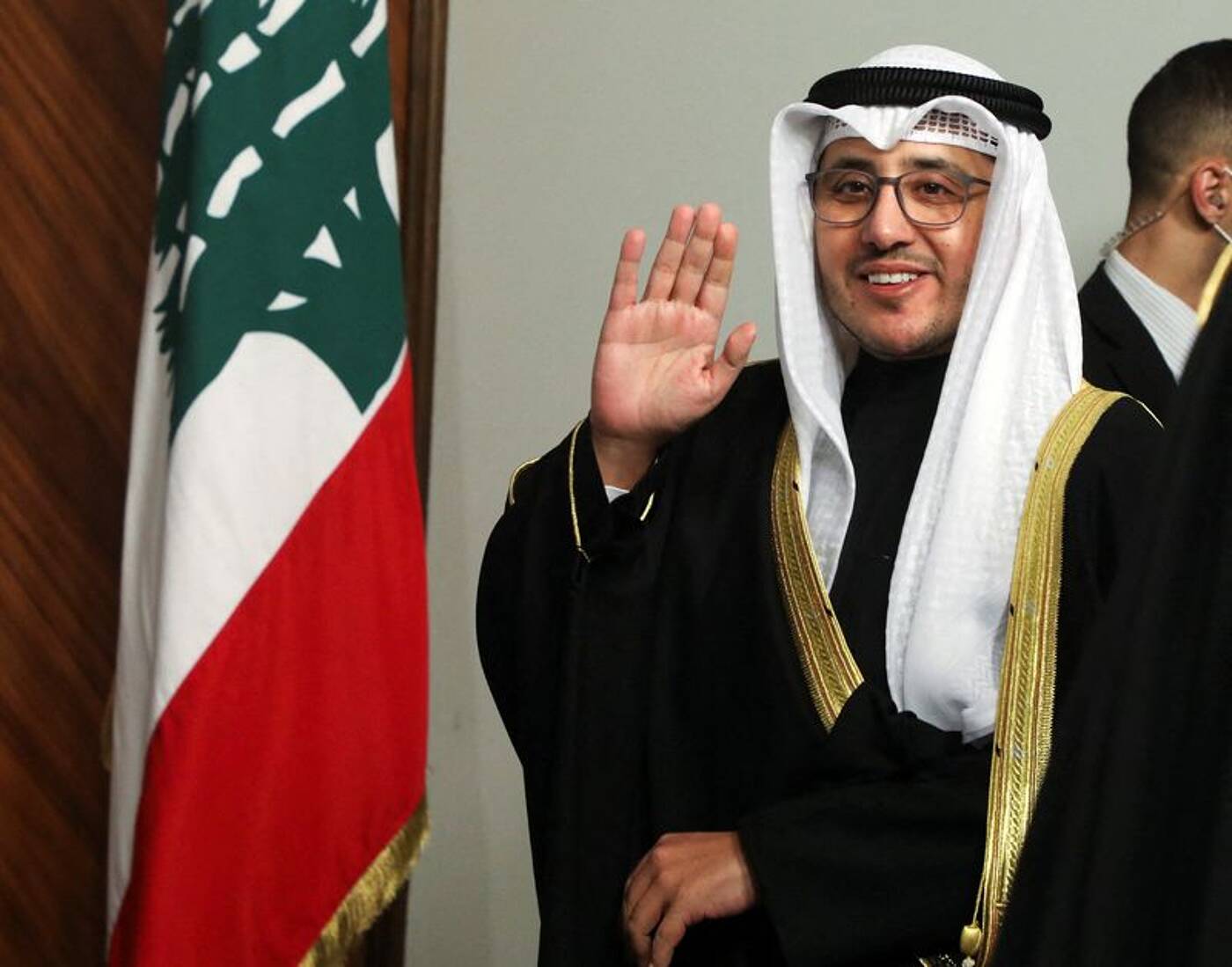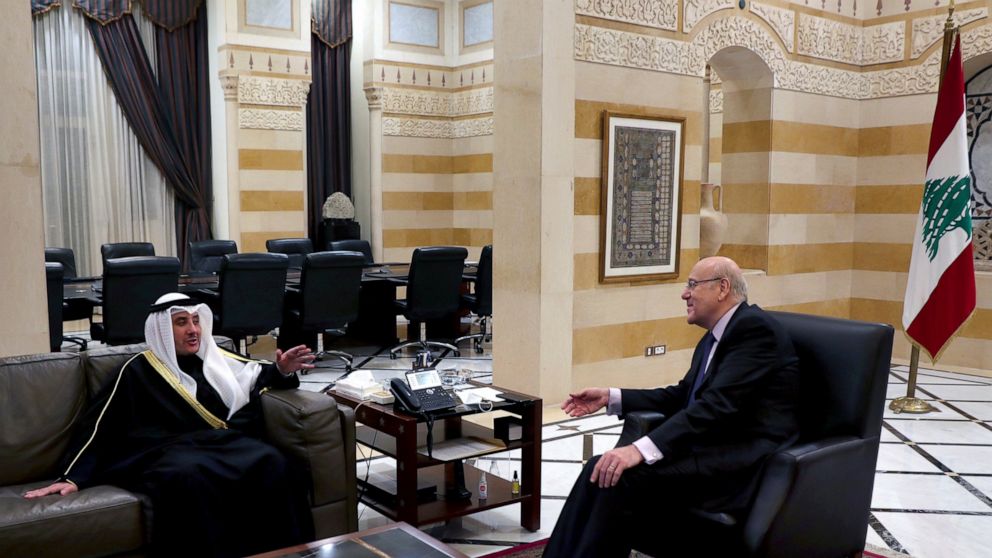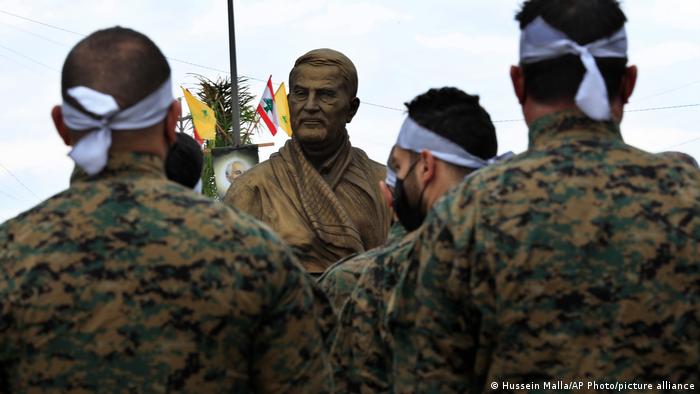By STEVEN GANOT — themedialine.org — The Nabu Museum in northern Lebanon returned five Roman antiquities to Syria on Thursday, after they …

BEIRUT (Reuters) -Kuwait’s foreign minister said on Sunday Lebanon must not be a platform for hostile acts or words toward Gulf Arab states, an indirect call for curbs on the Iran-backed group Hezbollah in order to improve strained ties. Kuwaiti Foreign Minister Sheikh Ahmad Nasser al-Mohammad al-Sabah spoke after meeting President Michel Aoun in Beirut, during the first visit https://www.reuters.com/world/middle-east/lebanons-pm-meet-kuwaiti-foreign-minister-beirut-2022-01-22 to Beirut by a senior Gulf Arab official since a diplomatic rift last year. Sheikh Ahmad said on Saturday he had delivered confidence-building proposals to Prime Minister Najib Mikati, and that his trip was coordinated with Gulf states. “We asked that Lebanon not be a platform for any aggression – verbal or actual,” Sheikh Ahmad said after meeting Aoun. “I presented ideas and thoughts … And we are awaiting a response,” he added.
Diplomatic sources told Reuters that among the 12-point proposals was that Lebanon commits to the 1989 Taif Agreement that ended Lebanon’s civil war, tightens border controls to prevent drug smuggling to the Gulf and steps up security cooperation. The Gulf initiative expressed hope that Beirut will respond by end of the month during a meeting of Arab foreign ministers in Kuwait. Lebanon’s ties have long been strained by the influence of the heavily armed Shi’ite group Hezbollah, and were plunged into a new crisis in October by comments from a former Lebanese minister criticizing Saudi-led forces fighting the Iran-aligned Houthi movement in Yemen. Kuwait was one of several members of the Gulf Cooperation Council (GCC), including Saudi Arabia, that responded to George Kordahi’s remarks by expelling the Lebanese ambassador and recalling its envoy to Beirut.

by aljazeera.com -- Gulf Arab states are looking to mend a standoff with Lebanon, Kuwait’s foreign minister said during a visit, the first by a senior Gulf official since the spat erupted last year. “This visit is one of various international efforts to restore trust with Lebanon,” Foreign Minister Sheikh Ahmed Nasser Al Mohammed Al Sabah said on Saturday after talks with Lebanese Prime Minister Najib Mikati at the start of a two-day trip. “We are now taking steps towards building trust … which doesn’t happen overnight,” he told reporters, calling on Lebanese authorities to take “practical and concrete measures” that could bolster ties. The minister said his visit was also to show solidarity with the Lebanese people, and that the move had been coordinated with other Gulf countries.
In October, Saudi Arabia and its allies suspended diplomatic ties with Lebanon after the airing of comments by the then Information Minister Georges Kordahi criticising a Saudi-led military intervention in Yemen. Kuwait recalled its ambassador from Beirut and also asked Beirut’s charge d’affaires to leave the emirate. Lebanon “should avoid interfering in the internal affairs of Arab states generally, but especially in Gulf internal affairs, and it should not be a launching pad for verbal or actual attacks” if it hopes to improve ties, Sheikh Ahmed said. The Kuwaiti official said he handed Mikati and his Lebanese counterpart Abdallah Bouhabib the demands and “now the brothers in Lebanon should study them and know how to deal with these matters and move ahead”. He refused to elaborate on what the demands are.

BEIRUT, Lebanon, By Dalal Saoud - upi.com -- (UPI) -- Lebanon's financial collapse, which has pushed large segments of the population into poverty, has also seen growing anger against the powerful Hezbollah, with more voices openly blaming it for the ongoing crisis and for its allegiance to Iran. Hezbollah's attempts to distinguish itself from the ruling corrupt political class, counting on its reputation as a resistance group that forced the withdrawal of Israeli occupying forces from south Lebanon in 2000 and battled the Islamic State in Syria, are no longer convincing to many, even to once loyal supporters. The group's growing dominance in internal politics, engagement in regional wars and in thwarting the 2019 popular uprising is tarnishing its image as the nation's defender, critics say. With a freezing winter, a continued 22-hour-a-day power cut, lack of diesel fuel and medicines coupled with exorbitant food prices, priorities are shifting to feeding the family, keeping warm, securing medical treatment or simply making ends meet.
U.S. sanctions 3 Lebanese businessmen, tourism company for aiding Hezbollah The poverty rate has nearly doubled -- from 42% in 2019 to 82% in 2021, according to the United Nations Economic and Social Commission for Western Asia. Over two years, the national currency has lost 90% of its value while the country witnesses a dramatic collapse in basic services, an unemployment surge and closure of businesses. Not spared from the hardship, complaints within Hezbollah's own community are not hidden anymore. "More and more people are expressing their discontent openly," said a Shiite woman, in her 60s from the Baalbeck region, a Hezbollah stronghold in eastern Lebanon with the highest number of the group's fighters killed in the Syria war. "They live day by day and are busy securing the basic things, like bread and diesel fuel."
Khazen History


Historical Feature:
Churches and Monasteries of the Khazen family

St. Anthony of Padua Church in Ballouneh
Mar Abda Church in Bakaatit Kanaan
Saint Michael Church in Bkaatouta
Saint Therese Church in Qolayaat
Saint Simeon Stylites (مار سمعان العامودي) Church In Ajaltoun
Virgin Mary Church (سيدة المعونات) in Sheilé
Assumption of Mary Church in Ballouneh
1 - The sword of the Maronite Prince
2 - LES KHAZEN CONSULS DE FRANCE
3 - LES MARONITES & LES KHAZEN
4 - LES MAAN & LES KHAZEN
5 - ORIGINE DE LA FAMILLE
Population Movements to Keserwan - The Khazens and The Maans
ما جاء عن الثورة في المقاطعة الكسروانية
ثورة أهالي كسروان على المشايخ الخوازنة وأسبابها
Origins of the "Prince of Maronite" Title
Growing diversity: the Khazin sheiks and the clergy in the first decades of the 18th century
Historical Members:
Barbar Beik El Khazen [English]
Patriach Toubia Kaiss El Khazen(Biography & Life Part1 Part2) (Arabic)
Patriach Youssef Dargham El Khazen (Cont'd)
Cheikh Bishara Jafal El Khazen
Patriarch Youssef Raji El Khazen
The Martyrs Cheikh Philippe & Cheikh Farid El Khazen
Cheikh Nawfal El Khazen (Consul De France)
Cheikh Hossun El Khazen (Consul De France)
Cheikh Abou-Nawfal El Khazen (Consul De France)
Cheikh Francis Abee Nader & his son Yousef
Cheikh Abou-Kanso El Khazen (Consul De France)
Cheikh Abou Nader El Khazen
Cheikh Chafic El Khazen
Cheikh Keserwan El Khazen
Cheikh Serhal El Khazen [English]
Cheikh Rafiq El Khazen [English]
Cheikh Hanna El Khazen
Cheikha Arzi El Khazen
Marie El Khazen